Unsure when to use credit card vs debit card and tired of mixed signals? Credit cards protect better against fraud, while debit cards help control spending. Here you’ll learn 10 clear tips for choosing between debit and credit wisely in 2025, managing your budget smarter, earning helpful rewards, and keeping your money safe.
Get ready to spend with confidence!
Key Takeaways
Credit cards give stronger fraud protection—your max loss is just $50—but with debit, delays in reporting can cost you $500 or even more.
Go credit for online buys, travel bookings, and big-ticket things—you snag rewards points and bonus perks like longer warranties.
Reach for debit on smaller everyday stuff, ATM visits, or keeping your spending in check—it only lets you use cash you already have, helping you stay debt-free.
In 2023, the average U.S. household owed about $7,951 on credit cards—easy proof that credit spending can quickly slip out of hand.
Credit cards improve your credit score if you pay on time—debit won’t offer that boost, but also has zero interest and no yearly fees.
Table of Contents
Credit Cards vs. Debit Cards: Key Differences
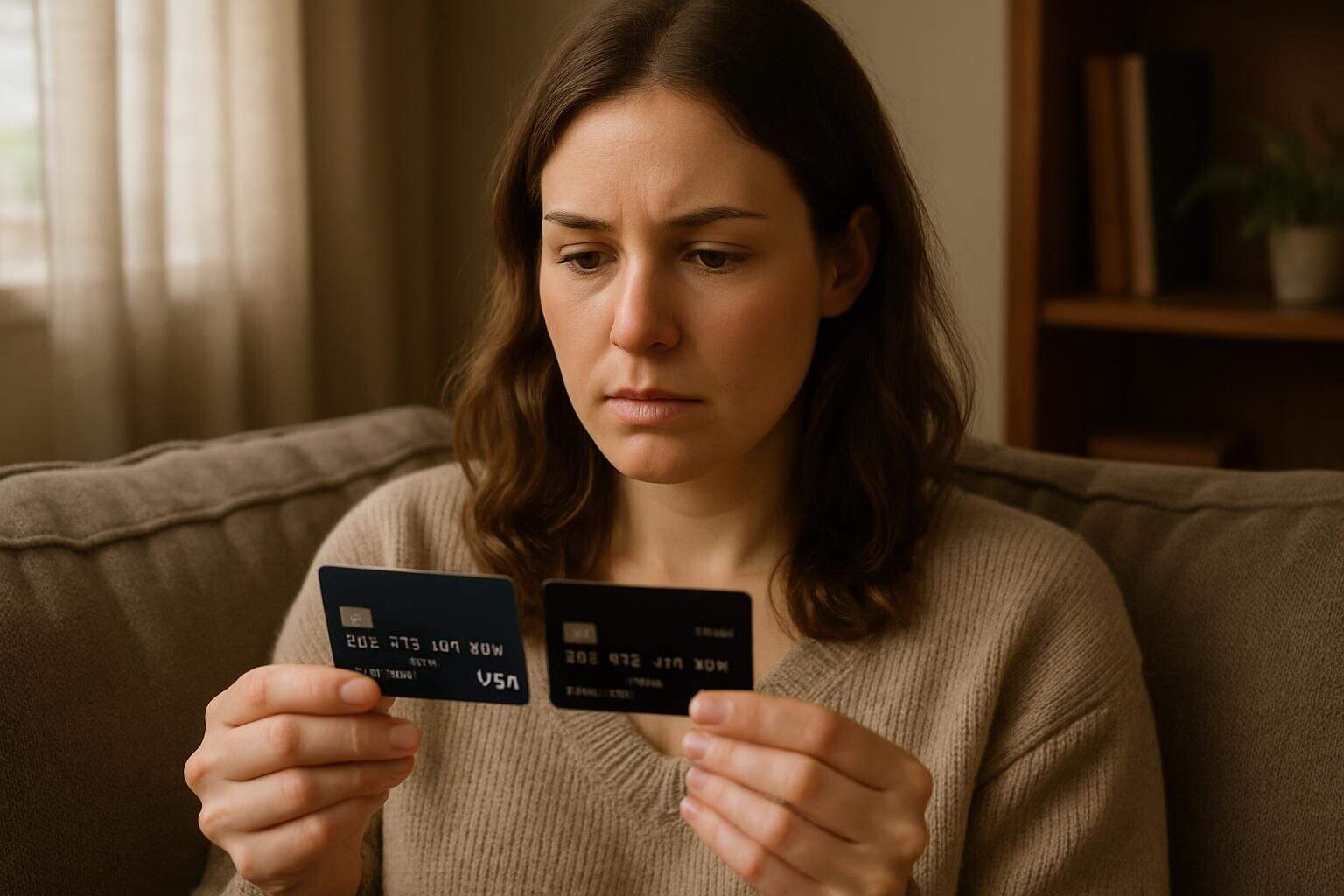
Credit cards and debit cards look similar but function very differently. Your choice between them affects your finances, security, and spending habits.
| Feature | Credit Cards | Debit Cards |
|---|---|---|
| Source of Funds | Borrowed money (line of credit) | Your own money from checking account |
| Payment Timing | Pay later (usually monthly) | Immediate withdrawal from account |
| Fraud Protection | Stronger ($50 max liability, $0 if reported before use) | Limited ($50 if reported within 2 days, $500 within 60 days, unlimited after) |
| Credit Building | Builds credit history | No impact on credit score |
| Rewards | Often offers cashback, points, miles | Minimal or no rewards |
| Fees | Annual fees, interest charges, late fees | Few fees, mainly overdraft charges |
| Spending Limit | Credit limit set by issuer | Limited to account balance |
| Market Share (2023) | 27% of global POS transaction value | 22% of global POS market |
| Purchase Protection | Extended warranties, purchase protection | Basic or no purchase protection |
| Cash Access | Cash advances (with high fees) | Direct ATM access to your funds via tarjeta de débito |
When to Use a Credit Card

Credit cards shine in specific money moments that can boost your wallet power. Smart women know when to pull out the plastic for max benefits and safety.
Building Credit History

Your credit card is like a small tool, building up your financial future brick by brick. Every timely payment adds another positive mark, boosting your credit score. Banks typically send your payment info to credit bureaus every month—that steady record is proof you handle money responsibly.
For lots of women, getting their first card can open doors later to lower loan rates and better housing opportunities.
But here’s a quick heads-up: always pay at least the minimum amount before the due date. Just one missed payment can seriously hurt your credit for as long as seven years! It’s smart to start small—pick purchases you’ll fully pay off each billing cycle.
Doing this keeps your debt down and helps build a solid credit history.
Now let’s talk bigger buys—expensive items or large purchases. A credit card can make these easier to manage, spreading out costs over time.
Large Purchases or Expensive Items
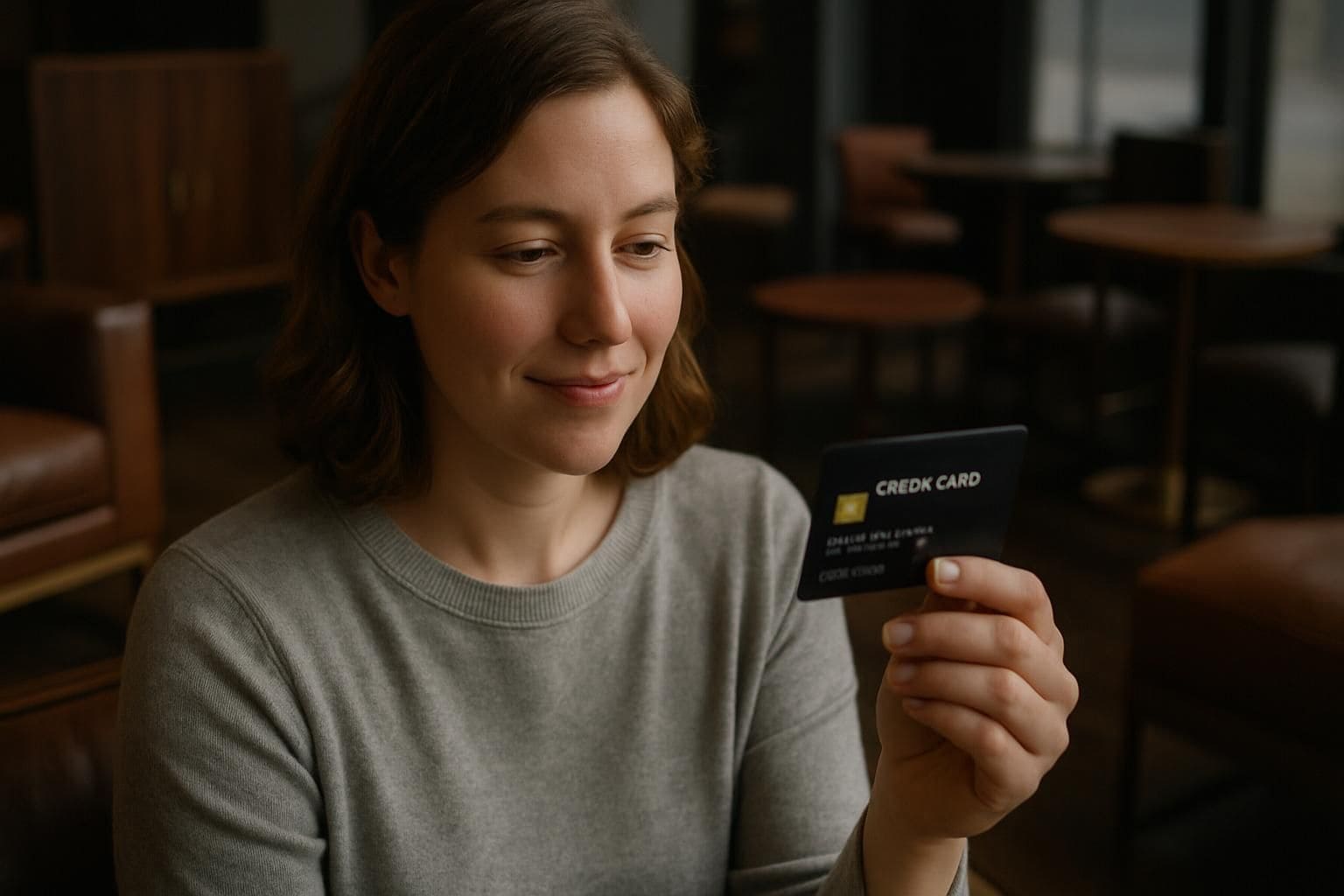
Good credit gives you better financial choices. Think about big buys—electronics, furniture, or even travel—all easier using credit cards. Many cards offer a 0% introductory APR for a set period—letting you pay off large purchases without interest.
Plus, credit cards often have built-in protection against theft, damage, and loss—something debit cards generally don’t cover.
Rewards from credit cards add up fast on major purchases, too. Cash back, store discounts, airline miles—you name it. Some even extend the warranty on what you buy, without charging you extra.
Just watch your spending closely, and pay balances promptly to keep interest from wiping out those advantages.
Online Shopping and Subscriptions

Shifting gears to your online buys—credit cards are your best bet for security online. They offer solid fraud protection on digital orders and recurring payments. If someone swipes your details online, you can challenge charges under the Fair Credit Billing Act.
Fraud won’t drain your checking account, unlike debit cards.
Many online stores save your card details for quicker checkout—using credit cards here beats linking debit cards directly to checking. Credit card providers regularly monitor your spending activity, alerting you if anything odd pops up.
This extra watchfulness makes credit cards the smartest pick for regular internet shopping and monthly payments in 2025.
Travel and Hotel Bookings
Credit cards really step up, especially for travel and hotel bookings. They give you extra protection if your trip gets canceled, or if the hotel stay isn’t what you expected. One popular choice is the Chase Sapphire Preferred Card—it offers solid perks travelers love.
It even includes travel insurance for stuff like delayed flights or lost luggage. Plus, many cards give points for every dollar spent traveling. Those points stack up quickly, leading to free flights or hotel stays down the line.
Hotels usually ask for a credit card to cover extra charges, like room service or minibar snacks. With a card, it’s easier to dispute charges if something goes wrong—like the hotel not delivering what they promised online.
Fraud protection is another big plus: credit cards keep your travel spending safer than debit cards ever could. And credit cards have other helpful perks worth exploring—beyond travel alone.
Earning Rewards and Cashback
Smart shoppers often choose credit cards for more than just trip protection—they want rewards. The Fifth Third 1.67% Cash/Back Card, for instance, gives you cash back at a rate of 1.67% on all purchases.
That’s a nice bump from standard cards offering around 1%. Your regular grocery visits and gas station stops quickly add to meaningful savings.
Rewards programs can feel like getting free money, as long as you pay your full balance monthly. Some cards even offer extra points for spending at restaurants or grocery stores. Those points easily turn into gift cards, travel discounts, or cash directly into your bank account.
Many women who keep an eye on their spending regularly earn hundreds per year—in rewards alone—just by sticking to everyday purchases.
When to Use a Debit Card
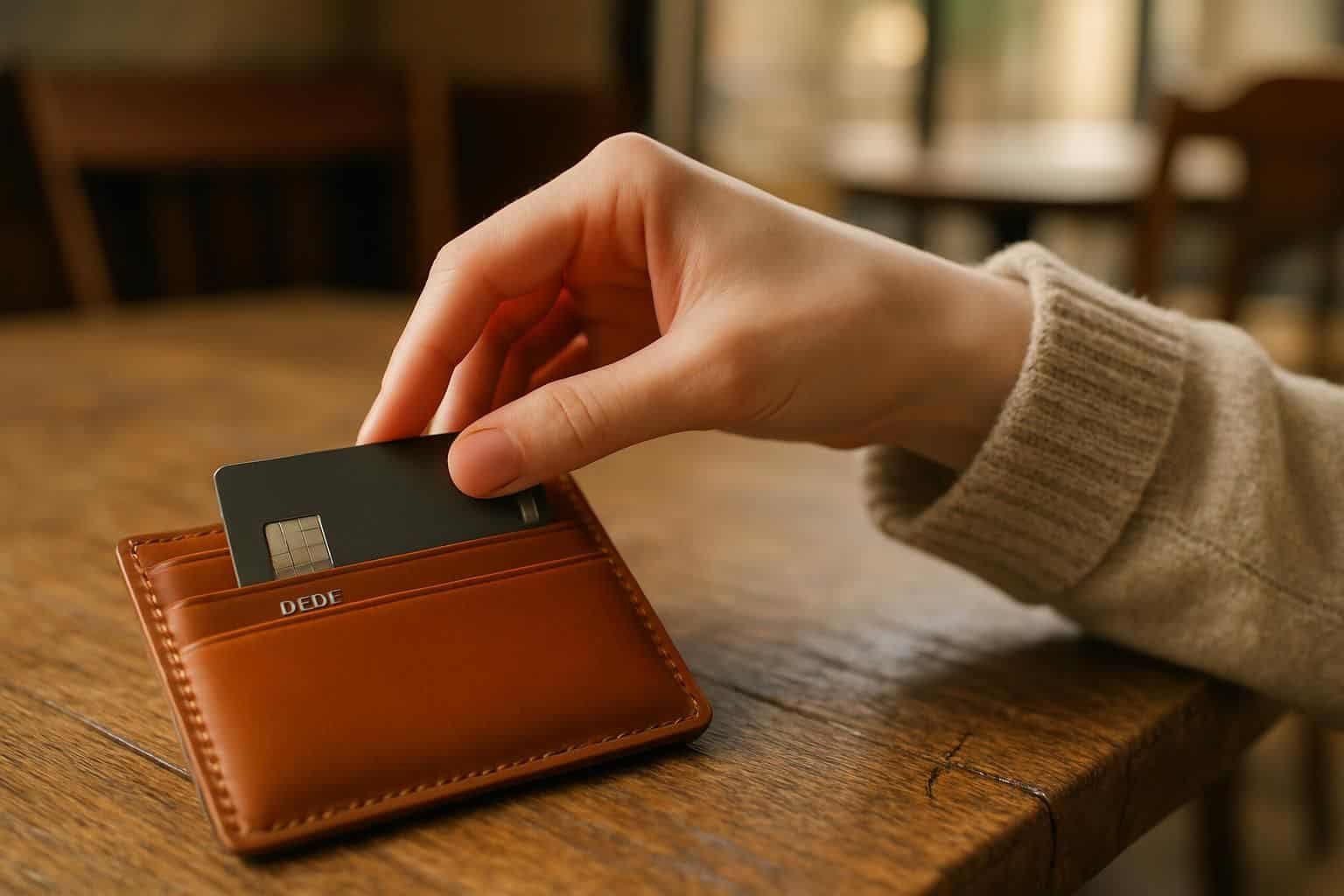
Debit cards shine in daily money tasks where you need quick, direct access to your funds. Smart women know when to pull out that debit card instead of credit for better money control and peace of mind.
Everyday Small Purchases
Your debit card works great for everyday purchases—think coffee, gas, or groceries. Those small buys pull money right from your checking account, making spending easy to track. Lots of women use debit cards for purchases under $50; it helps them stay on budget and avoid surprise credit balances at month’s end.
I use my debit card for my morning coffee and lunch breaks—it keeps me honest about what I’m really spending each day. – Sarah, financial coach
Since these bank-linked cards update instantly on your banking app, you can quickly see each purchase as it happens. That instant update shows clearly how much money you’ve got left.
For working women and busy moms, quick access to account balances helps avoid those embarrassing moments—like having your card declined because you’ve maxed out a credit limit.
Managing Budget and Avoiding Debt
Debit cards really shine as you shift from small, daily spending to handling bigger financial tasks. They’re tied directly to a checking account—meaning you simply can’t spend more than what’s there.
That direct link helps you track each dollar clearly, keeping debt traps away.
Many women like debit cards for regular bills because they clearly show monthly spending, making it easier to plan your family budget.
Plus, spending stays within the money you actually have, cutting out those pesky credit card interest fees.
Debit cards usually have fewer charges compared to credit cards, so that’s extra savings each month. Setting up quick balance alerts on your phone helps avoid surprise overdrafts—and keeps finances smooth and stress-free.
ATM Withdrawals
Your debit card works best for getting cash from ATMs. Credit cards at ATMs charge steep cash advance fees—usually around $10 or 5% of the transaction amount, whichever is higher.
Plus, interest starts piling up instantly, no grace period at all. But your debit card just pulls straight from your checking account, with no added fees beyond any out-of-network ATM charges.
Staying with your bank’s ATM network means no extra fees at all. Grocery stores can also hook you up with cash back—just buy something small and ask for money at checkout, totally fee-free.
Using your money smartly means knowing exactly which card fits the moment, especially when you’re grabbing quick cash for daily needs.
Avoiding Interest and Fees
Debit cards pull money directly from checking accounts—helping you skip those pricey credit card interest fees. Lots of banks even offer reward checking accounts with no monthly charges if you meet easy conditions, like setting up direct deposit or making a few debit buys each month.
Smart spenders regularly check their online banking apps to avoid overdraft penalties—which can hit $35 or more each time.
Credit card companies rake in billions every year from interest charges and late payment fees. To avoid these costs, always pay your full balance each month by the due date, and don’t miss any payments.
You can set up auto-payments online through your bank, at least for the minimum amount due. This habit alone can save you hundreds, protect your credit score, and help keep your spending in check.
Pros of Using Credit Cards

Credit cards pack a punch with benefits that go beyond simple spending. Your card offers strong fraud protection and can boost your credit score with each on-time payment.
Fraud Protection
Your credit card has strong protection against theft—with losses capped at $50 for fake charges. Most banks even drop that fee, offering zero-liability deals instead. So, if someone steals your card details, you usually pay nothing at all.
Card companies have smart systems to flag strange purchases right away. They quickly text or call you to check suspicious activity before things get worse. This makes credit cards safer than debit cards for many purchases.
Banks also keep watch nonstop for unusual account activity. Once something odd pops up, they freeze your card fast to prevent bigger problems. Debit cards connect directly to your checking account, making theft hurt more.
But with credit cards, thieves first spend the bank’s money, not your own. That gives you room and time to fix issues without losing personal funds.
Warranty and Purchase Protections
Credit cards give you extra shopping protections that debit cards just can’t match. Many top-tier cards extend manufacturer warranties—sometimes a full year longer—without charging you extra.
So, if the laptop or phone breaks after the store’s warranty runs out, your credit card might still cover repairs.
They also guard items against theft and accidental damage, usually for around 90 to 120 days after purchase. Cracked the screen on a phone you just bought? A quick call to the credit card company could get the repair costs covered.
Think of these perks as free insurance on bigger buys. Just hold onto receipts, call the credit card’s customer service, and fill out a simple form. These extra protections save money and headaches if a purchase goes wrong.
Credit Score Benefits
Aside from protecting your purchases, credit cards help raise your credit score—just by paying on time. Your payment history counts for 35% of your FICO score, so timely payments make your credit profile stronger.
Using your cards wisely proves to lenders that you’re responsible, leading to better loan deals and lower interest rates later on.
Regular card use also builds your credit history length—another big factor in your credit score. A good score (700 or higher) means easier approval for mortgages, car loans, and rental applications.
Many women find that having two or three active cards, while keeping balances low, works best to boost scores quickly.
Rewards and Perks
Credit cards don’t just boost your credit score—they bring real perks, too. Many offer rewards like cash back, travel points, or special store deals on regular purchases. Take the Fifth Third 1.67% Cash/Back Card, for example—it pays 1.67% back on everything you buy, every day.
Plus, some cards even throw in hidden extras—like free travel insurance, added warranty coverage for electronics, or refunds if prices drop after your purchase.
These rewards stack up faster than you’d think. Coffee runs, gas fill-ups, grocery shopping—they all count and add value over time. Certain cards offer bonus rewards for specific buys—think 5% back on groceries or even 3% back at gas stations.
Paying off your balance each month ensures interest charges won’t cut into those sweet perks.
Cons of Using Credit Cards

Credit cards can trap you in debt, hit you with steep fees, and hurt your credit score if you miss payments or max out your cards — read on to learn how to avoid these pitfalls while still enjoying credit card perks.
Risk of Debt Accumulation
Credit card debt can creep up quickly—and for many women, balances quietly balloon each month as interest adds up. In 2023, the average American household carries $7,951 in credit card debt.
Cards make spending feel easy…too easy. You swipe for dinners, outfits, or birthday gifts without the sting of watching cash disappear. Your credit limit might be $5,000 or even $10,000—but that’s borrowed money, not extra cash.
Interest rates typically range between 18% and 25%, meaning your $500 purchase grows into something much bigger if you don’t pay it off quickly. Some women rely on credit cards to bridge paycheck gaps, accidentally starting a tough-to-break cycle.
This debt trap doesn’t stop with your card balance—it ripples into your overall finances. High balances can damage your credit score, causing future loans to cost more. Your debt-to-income ratio climbs higher, possibly stopping you from getting a mortgage or financing a new car.
Many women even report losing sleep over mounting card debt, leading to stress that hurts their health and even relationships. A helpful tip: if you can’t afford to pay off the purchase by next month’s statement, pause before buying.
Your future self will feel relieved and grateful.
Interest and Late Fees
Late credit card payments can really hurt your wallet—fast. Most cards charge around 15-25% interest if you carry a balance. Just one $1,000 purchase might cost an extra $250 a year in interest alone.
And don’t overlook late fees—often $25-$40 each time you’re late. Those small charges add up quickly, eating into your budget and pushing you deeper into debt.
Your credit score takes a hit, too—every missed payment can lower your numbers, making it harder and pricier to borrow later. Many women set up automatic monthly payments to skip late fees altogether.
Some cards offer grace periods, meaning more time to pay without interest. Always take a few minutes to read the fine print—know the APR (annual percentage rate) details and exact payment due dates before signing up.
Credit Score Risks
Credit cards can hit your credit score pretty hard—if you’re not careful. If your balances sit over 30% of your limit, lenders see red flags, and your score takes a dip. Missed payments hurt even more, dropping scores up to 100 points.
Worse yet, late payments stay on reports for seven whole years. This penalty can be even tougher on women—they often get higher rates, even with solid payment histories. Each time you apply for a new card, a hard inquiry pops up, knocking 5 to 10 points off your score.
Rapidly opening new cards makes things worse. The smarter way: keep balances low, always pay on time, and take your time between new card applications.
Pros of Using Debit Cards

Debit cards offer a worry-free way to shop without racking up debt or surprise fees. They connect right to your checking account, making it easy to track what you spend in real time.
No Interest or Annual Fees
Using a debit card pulls funds directly from your checking account—no interest, no waiting. That means zero chances of sliding into credit card debt. Most banks hand out these cards free with standard checking accounts.
Your bank statement clearly lists every expense, without hidden fees popping up later. Many women enjoy debit cards to easily stick to budgets and avoid surprises at the month’s close.
Funds leave your account immediately, showing exactly what’s left to spend. Clear financial info means less overspending and simpler money management. Plus, no yearly fees mean extra cash stays in your wallet—for whatever matters most to you.
Up next, we’ll check out how debit cards simplify tracking spending habits.
Easy to Track Spending
Debit cards make it easy to track daily spending. Your bank statement clearly shows what went out, and exactly when. Most banks now offer apps that update your balance instantly after purchases—perfect for busy moms juggling budgets.
No more logging every expense by hand.
For women who struggle with impulse buying, debit cards help keep spending in check—you can only spend what’s already there. Seeing the balance drop right away acts like a built-in brake on spending.
Some moms even set text alerts on purchases above $50, just to stay aware of bigger buys or regular commitments like giving money to your parents.
Next, we’ll check out how debit cards deduct money from your account right away.
Immediate Deductions from Account
Using a debit card makes tracking your spending easier than ever. Each time you buy something, the money leaves your checking account right away—no waiting involved. You see exactly how much you spend almost instantly, and that means you always know your real balance.
No more waiting for month-end bills.
Every time you swipe, funds come directly out of your bank. Great news for anyone trying to stick to a daily budget—even better if you’re someone who likes to spend carefully. Many women especially like using debit cards to keep a closer eye on day-to-day spending habits.
But you’ve got to keep watch for anything strange on your account. Banks set tight limits on how long you have to report suspicious charges. Credit cards usually give you more time to catch problems, but debit cards need quicker action.
Cons of Using Debit Cards

Debit cards lack the strong safeguards that credit cards offer against fraud. Your bank account sits wide open to risk when thieves get your card info, and you might face more hassle getting your money back after theft.
Limited Fraud Protections
Credit cards protect you from fraud better than debit cards—especially if you’re shopping online. Your debit card connects directly to your checking account, giving thieves a straight path to drain your money in minutes.
Federal law keeps your losses capped at just $50 if you catch and report the fraud within two days—but it’s rarely that simple. Your money stays missing while the bank investigates, sometimes for weeks.
Losing funds you depend on for rent, groceries, and bills creates serious stress.
Credit cards come with stronger safeguards. The Fair Credit Billing Act limits your liability to $50 regardless of how long it takes you to notice fraud. And many card companies now promise zero-liability coverage—you won’t owe a cent.
During disputes, your actual funds remain secure in your checking account, untouched. For online purchases, monthly subscriptions, or travel planning, credit cards offer protection debit cards can’t compete with.
No Credit Building
Debit cards don’t build your credit score, period. Each purchase pulls cash directly from your bank account—but credit bureaus never see it. So, even if you manage your money perfectly every month, your credit history stays blank! Many women miss this key detail while handling daily bills.
Using only debit means you could pay promptly for years and still end up with a thin credit report.
Missing credit history can become an obstacle later—for home loans, car financing, or even certain job applications. Banks and lenders always check credit scores to see your money habits.
Without a solid report, you might get stuck paying higher interest rates, or worse—have your loan rejected outright.
Some women solve this issue by getting a secured credit card. They use it to cover small monthly expenses and pay off the balance completely each month. This simple habit helps build credit history without adding debt.
Fewer Rewards or Benefits
Credit cards offer more perks than debit cards—hands down. Most debit cards linked to checking accounts don’t offer cash back or rewards. Every time you swipe with debit, you miss chances for travel points, cash rebates, or store deals.
Credit cards often provide rewards of 1–5% on gas, groceries, or dining. Some cards even throw in bonus points just for signing up. Your debit card just takes cash straight from your account—no extras included.
Tips for Managing Both Cards Wisely

Smart money moves like paying off balances on time, setting clear limits, and tracking your spending help you get the most from both cards – check out our full guide for more tips to master your plastic in 2025!
Pay Credit Card Balances in Full
Paying your credit card off each month is a top money habit. Cards typically carry steep interest—around 15% to 25%—for amounts left unpaid. Here’s an easy example: a $1,000 balance at 20% APR adds roughly $200 a year in interest alone.
To stay safe, set up automatic payments from your checking account, making sure you’re never late. Most card companies offer text or email alerts with balance updates and payment reminders, making your life easier.
Paying in full also boosts your credit score. Credit bureaus keep tabs on your payment history and credit use ratio—that’s just how much of your available credit you spend. Having a zero balance signals to lenders that you’re a good money manager.
A smart plan means using your credit card for planned buys, staying within your budget. Avoid impulse shopping—it can quickly lead you into unnecessary debt. Set clear spending limits to keep expenses in check and to steer clear of overspending.
Set Spending Limits
Smart spending starts with clear limits. Set spending caps for each card to match your budget goals. For example—set $200 per month on your credit card for dining out, and $400 on your debit card for groceries.
Many banking apps let you set alerts, buzzing your phone as you reach these limits. That quick buzz can stop impulse buys in their tracks.
Category caps make a big difference. Set clear ceilings for food, entertainment, shopping, and bills. Then, watch your progress through your card’s app or online dashboard. Apps like Space Coast Credit Union offer easy color-coded charts to track spending.
Stick to these targets, and your checking account stays in great shape.
Monitor Transactions Regularly
Make it a weekly habit to glance over your card statements. A quick check stops money issues, before they become big headaches. Many banks offer free text alerts—sending instant notifications for spending over $10.
Turn those alerts on, and you’ll spot fraud right away.
Also, enable push notifications in your banking app for every card swipe. That way, you’ll notice strange charges immediately—not months later after bills add up.
Banks usually give you just 60 days to report debit card problems. Credit cards allow a bit more time, but the sooner you speak up, the easier it’ll be to resolve. Scan your transactions weekly for odd store names, incorrect amounts, or duplicate charges.
Many women like doing a quick five-minute check on Sunday evenings—it creates a money-safe habit that’s easy to stick with.
How Will Credit and Debit Card Usage Evolve in 2025?
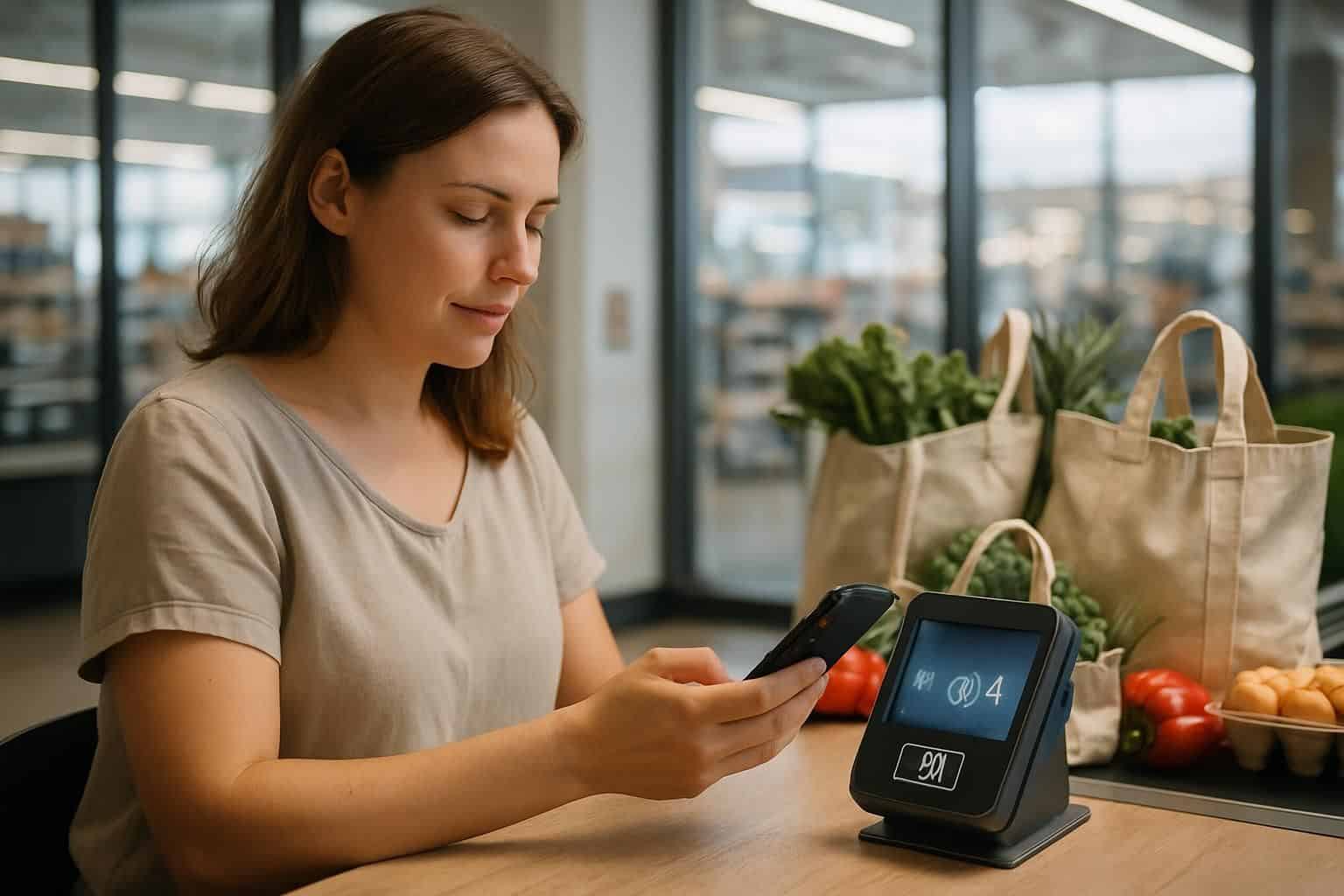
By 2025, credit cards will dominate payments—offering better perks like rewards of 2% or more per purchase. Women shoppers will enjoy improved fraud security, both online and in-person.
Credit cards will also be a handy way to build credit history, helpful for getting loans or renting an apartment later. Many folks will pick credit over debit in emergencies, since credit gives extra spending flexibility.
Debit cards won’t disappear, but they’ll stay simpler, with fewer bonuses compared to credit options. Banks might toss in small cashback deals for debit users, just to stay in the game.
Two-factor authentication becomes standard on all cards, adding another layer of safety for your money. Digital wallets linked easily to either type of card will catch on quickly—making tap-to-pay the usual choice at most checkouts.
Savvy women will likely grab their credit cards for bigger buys or travel expenses—but stick with debit for small daily stuff like coffee runs or quick supermarket stops.
People Also Ask
When should I use a credit card instead of a debit card?
Credit cards are great for bigger buys, online shopping, and trips. They offer extra safety against fraud—and don’t tap straight into your checking account. Plus, they build your credit score and usually come with perks—like cashback or travel points.
What are the main benefits of using debit cards?
Debit cards keep your spending under control—you can only use what you have. They connect right to your checking account, don’t charge interest, are handy for everyday spending, and make ATM withdrawals easy. Most debit cards don’t charge yearly fees, either.
How do credit cards and debit cards differ in fraud protection?
With credit cards, if fraud happens, your responsibility usually tops out at $50. Debit cards can cost you more if you’re slow reporting fraud. Credit card disputed charges disappear while the bank investigates—but debit card fraud means your money stays gone until the review wraps up.
Are there times when I should avoid using my credit card?
Skip using credit cards for cash advances—expensive fees and heavy interest add up fast. If you’re facing big credit card debt, or can’t cover your balance each month, leave the credit card alone. Avoid swiping the credit card for everyday small buys—it gets tough tracking small charges.
What fees should I watch for with both card types?
Credit cards often have yearly fees, late fees, and extra fees for foreign transactions. Debit cards might charge you ATM fees, overdraft charges, or monthly account charges. Some stores even add extra costs for using any type of card at checkout.
How can I maximize rewards with my payment methods?
Use rewards credit cards in categories that give back the most points—like flights or restaurants. Be careful to pay your full balance monthly, or the interest will wipe out what you earned. For small everyday costs, think about using a checking account debit card with rewards—it helps make the most of your money management.
References
https://www.joinkudos.com/blog/credit-card-vs-debit-card-which-should-you-use-in-2025
https://www.getonecard.app/blog/how-to-use-a-credit-card-to-build-credit/
https://www.bankrate.com/credit-cards/advice/using-a-credit-card-for-large-purchases/
https://www.td.com/us/en/personal-banking/when-to-use-credit-or-debit-card
https://thriftytraveler.com/guides/credit-card/credit-card-vs-debit-card-booking-travel/
https://colony.bank/should-i-use-a-debit-card-or-a-credit-card/
https://www.investopedia.com/articles/personal-finance/050214/credit-vs-debit-cards-which-better.asp
https://www.myfirstfarmers.com/the-pros-and-cons-of-using-credit-cards-vs-debit-cards/ (2025-04-21)
https://www.moneytalksnews.com/slideshows/things-you-should-definitely-put-on-a-credit-card-and-why/ (2025-05-14)
https://www.pnc.com/insights/personal-finance/spend/debit-cards-vs-credit-cards.html (2024-07-10)
https://www.clearlypayments.com/blog/debit-vs-credit-which-payment-method-do-consumers-prefer-in-2025/ (2025-02-13)
